Civil rights icon John Lewis dies at age 80
In 2019, the longtime Democratic congressman and civil rights icon announced he was undergoing treatment for advanced pancreatic cancer.
U.S. Rep. John Lewis, D-Ga., one of the nation’s most preeminent civil rights figures, died Friday night. He was 80.
The congressman had been battling pancreatic cancer.
Lewis’ journey took him from protests against Jim Crow laws in the South – including the 1963 March on Washington and the 1965 Selma-to-Montgomery march known as “Bloody Sunday” -- to a long career representing Georgia in the House of Representatives.
REV. CT VIVIAN, CIVIL RIGHTS VETERAN WHO WORKED WITH MARTIN LUTHER KING, DEAD AT 95
Lewis was 23 years old when he joined the Rev. Martin Luther King Jr. and other speakers outside the Lincoln Memorial as part of the March on Washington. Lewis was the last surviving speaker from the event, The Washington Post reported.
"Farewell, sir," Bernice King, the youngest child of MLK, wrote on Twitter. "You did, indeed, fight the good fight and get into a lot of good trouble. You served God and humanity well. Thank you. Take your rest."
"Good trouble" was a favorite phrase that Lewis used to refer to political activism.
Word of Lewis' death came just hours after that of another noted civil rights activist, the Rev. C.T. Vivian, who died Friday at age 95.
"Not many of us get to live to see our own legacy play out in such a meaningful, remarkable way," former President Barack Obama wrote on Twitter. "John Lewis did."
Joe Biden, who served as Obama's vice president and is the Democratic Party's presumptive 2020 presidential nominee, wrote on Twitter: "We are made in the image of God, and then there is John Lewis. He was truly one-of-a-kind, a moral compass who always knew where to point us and which direction to march. To John’s family, friends, staff, and constituents, Jill and I send you our love and prayers."
Biden released a fuller statement via Medium.
Current Vice President Mike Pence said: "Congressman John Lewis was a great man whose courage and decades of public services changed America forever, and he will be deeply missed. John Lewis will be remembered as a giant of the civil rights movement whose selflessness and conviction rendered our nation into a more perfect union and his example will inspire generations of Americans.
"While John Lewis will be rightly remembered as an icon of the civil rights movement, for me he was also a colleague and a friend. Even when we differed, John was always unfailingly kind and my family and I will never forget the privilege of crossing the Edmund Pettus Bridge at his side on the 45th anniversary of Bloody Sunday.
"Karen and I send out prayers and deepest sympathies to his family and friends and all who mourn the passing of this good and great man. May God bless the memory of John Lewis and may his example ever inspire."
Former President George W. Bush issued a statement, saying: "Laura and I join our fellow Americans in mourning the loss of Congressman John Lewis. As a young man marching for equality in Selma, Alabama, John answered brutal violence with courageous hope. And throughout his career as a civil rights leader and public servant, he worked to make our country a more perfect union. America can best honor John's memory by continuing his journey toward liberty and justice for all."
"We have lost a giant," former President Bill Clinton and former Secretary of State Hilary Clinton said in a statement. "John Lewis gave all he had to redeem America's unmet promise of equality and justice for all, and to create a place for us to build a more perfect union together."
Former President Jimmy Carter also paid tribute on Saturday morning, via The Carter Center.
"Rosalynn and I are saddened by the death of Congressman John Lewis. He made an indelible mark on history through his quest to make our nation more just. John never shied away from what he called 'good trouble' to lead our nation on the path toward human and civil rights. Everything he did, he did in a spirit of love. All Americans, regardless of race or religion, owe John Lewis a debt of gratitude. We send our condolences and prayers to his family and friends."
White House Press Secretary Kayleigh McEnany wrote: "Rep. John Lewis was an icon of the civil rights movement, and he leaves an enduring legacy that will never be forgotten. We hold his family in our prayers, as we remember Rep. John Lewis’ incredible contributions to our country."
House Speaker Nancy Pelosi, D-Calif., confirmed Lewis’ passing late Friday night, calling him “one of the greatest heroes of American history.”
REP. JOHN LEWIS DIAGNOSED WITH STAGE 4 PANCREATIC CANCER
“All of us were humbled to call Congressman Lewis a colleague, and are heartbroken by his passing,” Pelosi said. “May his memory be an inspiration that moves us all to, in the face of injustice, make ‘good trouble, necessary trouble.’”
'Put his life on the line'
Senate Majority Leader Mitch McConnell, R-Ky., also paid tribute to Lewis.
"The Senate and the nation mourn the loss of Congressman John Lewis, a pioneering civil rights leader who put his life on the line to fight racism, promote equal rights, and bring our nation into greater alignment with its founding principles," McConnell wrote.
Georgia Gov. Brian Kemp said Lewis "changed our world in profound and immeasurable ways."
"A civil rights icon, freedom fighter, and beloved Georgian, @repjohnlewis lost his battle with cancer today," Kemp wrote on Twitter. "Our nation will never be the same without him. There are no words to adequately express the sadness that countless Americans are feeling upon learning this news.
"John Lewis changed our world in profound and immeasurable ways. @GAFirstLady, the girls, and I are praying for all his loved ones, friends, and colleagues in this incredibly difficult time."
Sen. Tim Scott, R-S.C., wrote: "I am deeply saddened by the passing of my good friend, John Lewis. I’m grateful for his encouragement during my tenure in Congress. He welcomed me with open arms when I came to the House in 2011.
"One of the great honors of my life was co-chairing the trip to Selma and the Edmund Pettus Bridge with John, on the anniversary of Bloody Sunday. He was a giant among men; his life and legacy will continue to serve as an example for the generations to come.
"I am encouraged by his courage, determination, and perseverance, characteristics that we can all try to emulate – especially in the wake of current events. My prayers are with the Lewis family during this time."
Lewis’s announcement in late December 2019 that he had been diagnosed with advanced pancreatic cancer — “I have never faced a fight quite like the one I have now,” he said — inspired tributes from both sides of the aisle, and an unstated accord that the likely passing of this Atlanta Democrat would represent the end of an era.
JOHN LEWIS VISITS BLACK LIVES MATTER PLAZA IUN DC, SYMBOL OF GEORGE FLOYD ANGER: 'VERY MOVING'
'Big Six' activists
Lewis was the youngest and last survivor of the Big Six civil rights activists, a group led by the Rev. Martin Luther King Jr. that had the greatest impact on the movement. He was best known for leading some 600 protesters in the Bloody Sunday march across the Edmund Pettus Bridge in Selma.
At age 25 — walking at the head of the march with his hands tucked in the pockets of his tan overcoat — Lewis was knocked to the ground and beaten by police. His skull was fractured, and nationally televised images of the brutality forced the country’s attention on racial oppression in the South.
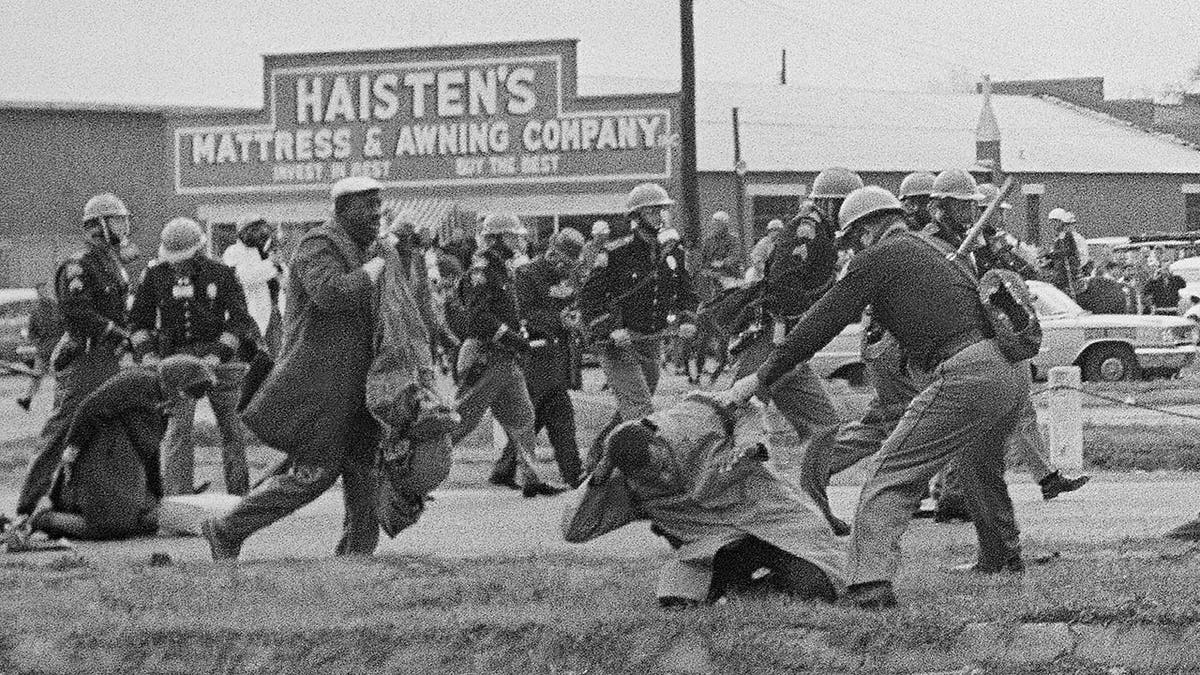
A state trooper swings a billy club at John Lewis, right foreground, chairman of the Student Nonviolent Coordinating Committee, to break up a civil rights voting march in Selma, Ala., March 7, 1965. (Associated Press)
Within days, King led more marches in the state, and President Lyndon Johnson soon was pressing Congress to pass the Voting Rights Act. The bill became law later that year, removing barriers that had barred Blacks from voting.
“John is an American hero who helped lead a movement and risked his life for our most fundamental rights; he bears scars that attest to his indefatigable spirit and persistence,” House Majority Leader Steny Hoyer said after Lewis announced his cancer diagnosis.
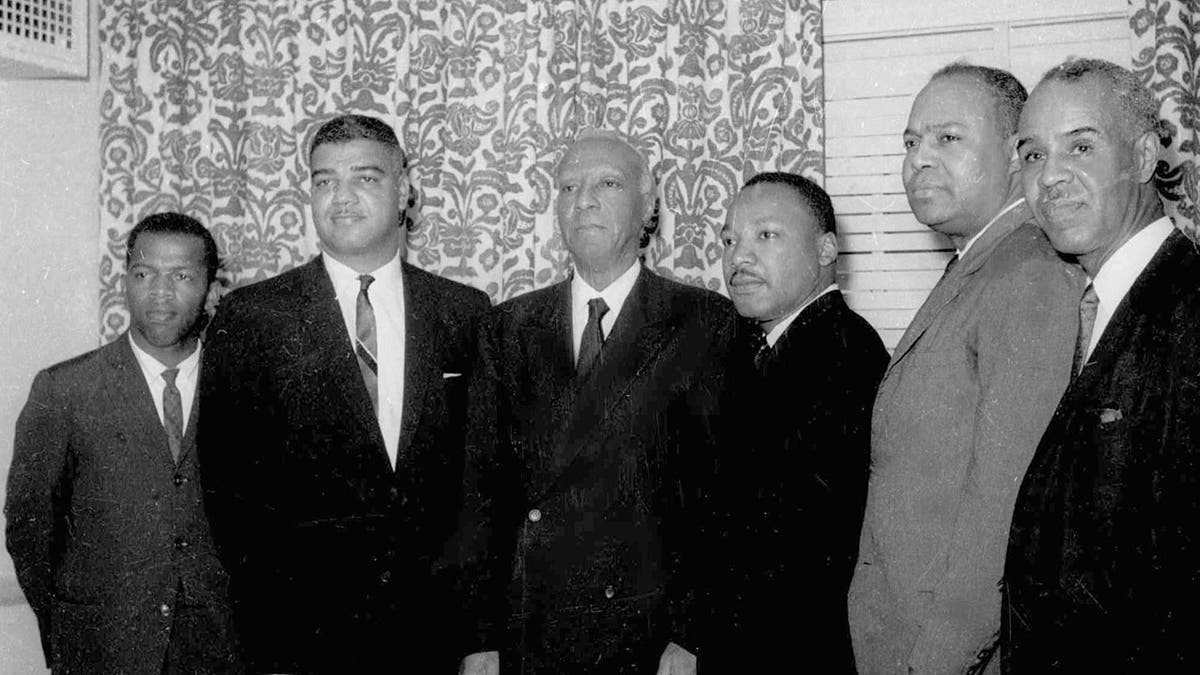
Six leaders of the nation's largest black civil rights organizations pose are seen at the Roosevelt Hotel in New York City, July 2, 1963. From left are: John Lewis, chairman Student Non-Violence Coordinating Committee; Whitney Young, national director, Urban League; A. Philip Randolph, president of the Negro American Labor Council; Martin Luther King Jr., president Southern Christian Leadership Conference; James Farmer, Congress of Racial Equality director; and Roy Wilkins, executive secretary, National Association for the Advancement of Colored People. (Associated Press)
Lewis joined King and four other civil rights leaders in organizing the 1963 March on Washington. He spoke to the vast crowd just before King delivered his epochal “I Have a Dream” speech.
A 23-year-old firebrand, Lewis toned down his intended remarks at the insistence of others, dropping a reference to a “scorched earth” march through the South and scaling back criticisms of President John Kennedy. It was a potent speech nonetheless, in which he vowed: “By the forces of our demands, our determination and our numbers, we shall splinter the segregated South into a thousand pieces and put them together in an image of God and democracy.”
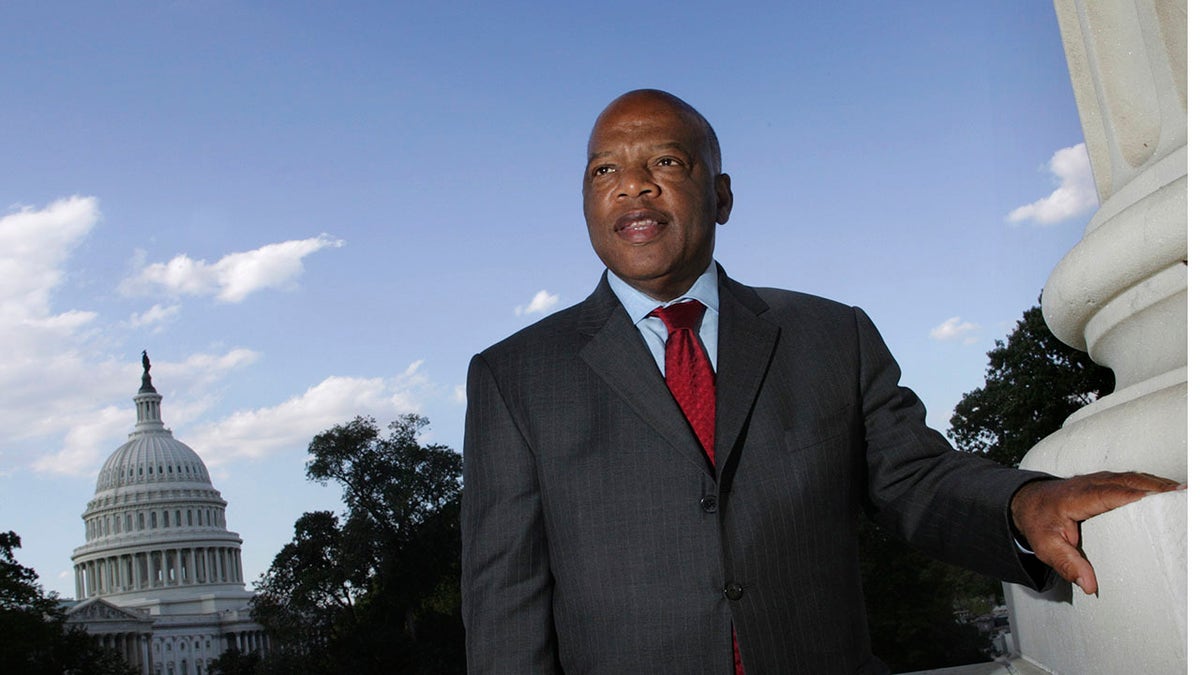
U.S. Rep. John Lewis, D-Ga., is seen on Capitol Hill in Washington, Oct. 10, 2007. (Associated Press)
It was almost immediately, and forever, overshadowed by the words of King, the man who had inspired him to activism.
Humble beginnings
Lewis was born on Feb. 21, 1940, outside the town of Troy, in Pike County, Alabama. He grew up on his family’s farm and attended segregated public schools.
JOHN LEWIS ENDORSES BIDEN: 'HE WILL LEAD OUR COUNTRY TO A BETTER PLACE'
As a boy, he wanted to be a minister, and practiced his oratory on the family chickens. Denied a library card because of the color of his skin, he became an avid reader, and could cite obscure historical dates and details even in his later years. He was a teenager when he first heard King preaching on the radio. They met when Lewis was seeking support to become the first Black student at Alabama’s segregated Troy State University.
He ultimately attended the American Baptist Theological Seminary and Fisk University in Nashville, Tennessee. He began organizing sit-in demonstrations at whites-only lunch counters and volunteering as a Freedom Rider, enduring beatings and arrests while traveling around the South to challenge segregation.
Lewis helped found the Student Nonviolent Coordinating Committee and was named its chairman in 1963, making him one of the Big Six at a tender age. The others, in addition to King, were Whitney Young of the National Urban League; A. Philip Randolph of the Negro American Labor Council; James L. Farmer Jr., of the Congress of Racial Equality; and Roy Wilkins of the NAACP. All six met at the Roosevelt Hotel in New York to plan and announce the March on Washington.
The huge demonstration galvanized the movement, but success didn’t come quickly. After extensive training in nonviolent protest, Lewis and the Rev. Hosea Williams led demonstrators on a planned march of more than 50 miles from Selma to Montgomery, Alabama’s capital, on March 7, 1965. A phalanx of police blocked their exit from the Selma bridge.
Authorities shoved, then swung their truncheons, fired tear gas and charged on horseback, sending many to the hospital and horrifying much of the nation. King returned with thousands, completing the march to Montgomery before the end of the month.
Turn to politics
Lewis turned to politics in 1981, when he was elected to the Atlanta City Council.
He won his seat in Congress in 1986 and spent much of his career in the minority. After Democrats won control of the House in 2006, Lewis became his party’s senior deputy whip, a behind-the-scenes leadership post in which he helped keep the party unified.
In an early setback for Barack Obama’s 2008 Democratic primary campaign, Lewis endorsed Hillary Rodham Clinton for the nomination. Lewis switched when it became clear Obama had overwhelming Black support. Obama later honored Lewis with the Presidential Medal of Freedom, and they marched hand in hand in Selma on the 50th anniversary of the Bloody Sunday attack.
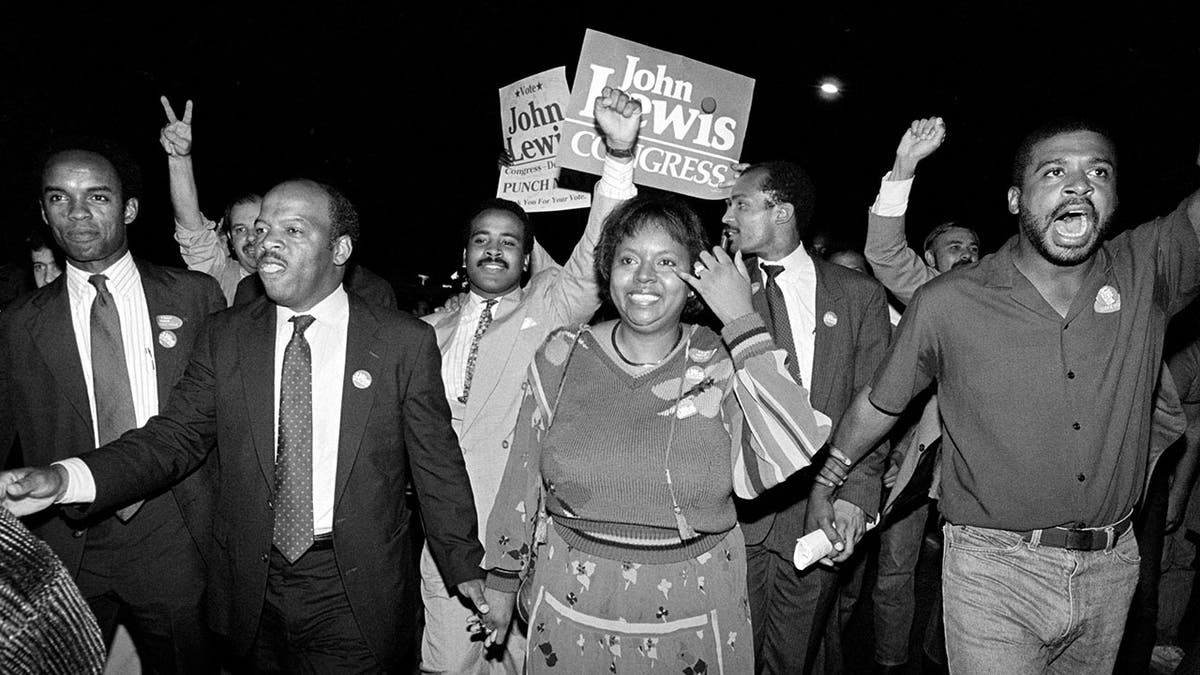
John Lewis, front left, and his wife, Lillian, holding hands, lead a march of supporters from his campaign headquarters to an Atlanta hotel for a victory party after he defeated Julian Bond in a runoff election for Georgia's 5th Congressional District seat in Atlanta, Sept. 3, 1986. (Associated Press)
Lewis also worked for 15 years to gain approval for the Smithsonian’s National Museum of African American History and Culture. Humble and unfailingly friendly, Lewis was revered on Capitol Hill -- but as one of the most liberal members of Congress, he often lost policy battles, from his effort to stop the Iraq War to his defense of young immigrants.
Bipartisan success
He met bipartisan success in Congress in 2006 when he led efforts to renew the Voting Rights Act, but the Supreme Court later invalidated much of the law, and it became once again what it was in his youth, a work in progress. Later, when the presidency of Donald Trump challenged his civil rights legacy, Lewis made no effort to hide his pain.
Lewis refused to attend Trump’s inauguration, saying he didn’t consider him a “legitimate president” because Russians had conspired to get him elected. When Trump later complained about immigrants from “s---hole countries,” Lewis declared, “I think he is a racist ... we have to try to stand up and speak up and not try to sweep it under the rug.”
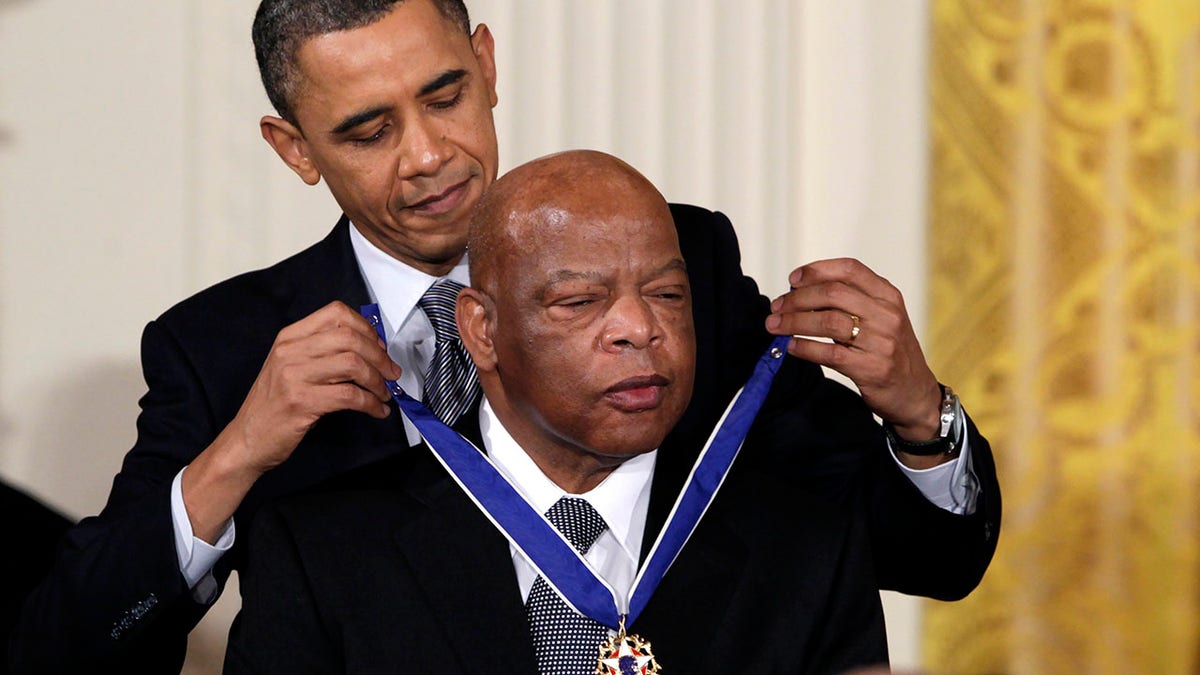
President Barack Obama presents a 2010 Presidential Medal of Freedom to U.S. Rep. John Lewis, D-Ga., during a ceremony in the East Room of the White House in Washington, Feb. 15, 2011. (Associated Press)
Lewis said he’d been arrested 40 times in the 1960s, five more as a congressman. At 78, he told a rally he’d do it again to help reunite immigrant families separated by the Trump administration.
“There cannot be any peace in America until these young children are returned to their parents and set all of our people free,” Lewis said in June, recalling the “good trouble” he got into protesting segregation as a young man.
“If we fail to do it, history will not be kind to us,” he shouted. “I will go to the border. I’ll get arrested again. If necessary, I’m prepared to go to jail.”
CLICK HERE TO GET THE FOX NEWS APP
In a speech the day of the House impeachment vote of Trump, Lewis explained the importance of that vote.
“When you see something that is not right, not just, not fair, you have a moral obligation to say something, to do something. Our children and their children will ask us ‘what did you do? what did you say?” While the vote would be hard for some, he said: “We have a mission and a mandate to be on the right side of history.”
Lewis’ wife of four decades, Lillian Miles, died in 2012. They had one son, John Miles Lewis.
The Associated Press contributed to this story.






